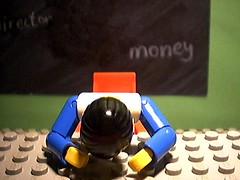
As others have already noted, Desire2Learn has updated their patent info blog with a smorgasbord of new information. (Frustratingly, the posts on the blogs don’t seem to have permalinks. Except when they do. Ugh.) Anyway, you can go to their blog and look at the April 29th entry for the details, but here are the highlights from my perspective:
- With Blackboard’s new Canadian patent infringement suit, we’re going to get a view into whether other countries have less insane legal systems for dealing with intellectual property than we do. It should be interesting. D2L provides some early clues in this direction, explaining that the process, at least for the initial trial, is more streamlined and less expensive.
- Blackboard has filed for a 30-day extension to return its arguments to the USPTO regarding the non-final action invalidating their (original) patent. D2L alleges that this is a stalling tactic, which makes sense, given that the Federal Circuit court could rule any time now, and that a positive ruling there first could head off the anticipated negative ruling in the USPTO.
- D2L also alleges that Blackboard has a pattern of launching a new legal assault within days of having a ruling go against them. Again, this makes sense as a possible legal strategy. If Blackboard’s goal is to keep this thing alive in the courts until the bitter end, they they would have a new attack queued up and ready to go as soon as the old one runs out of gas.
- D2L mentions that they are considering filing a new re-examination. It’s not clear if this would be against the original patent or the continuation patent. If the former, it means that they have uncovered new prior art. Under the rules of an inter partes challenge (which is the kind of patent challenge that D2L filed), they were legally required to disclose all prior art they were aware of at the time of filing. However, if it’s against the continuation patent, things get murkier. Blackboard would have been legally required to put all the prior art being asserted against the old patent in their filing for the new one. You would think that would innoculate them against the old prior art, but that’s not necessarily true. It depends on how much written analysis the patent examiner gave to the prior art. If it was essentially rubber stamped, then D2L (or some other party) could go back to the USPTO and assert that the patent examiner failed to consider the prior art in certain combinations. At any rate, it will be interesting to see if D2L does, in fact, have newly discovered prior art.
- D2L reminds us that Blackboard is spending a ton of money on patent litigation and points to a proxy statement from the company showing that Blackboard froze salaries and cut 401K matching for its employees in 2008 (the implication being that employees are being squeezed to pay the litigation costs). Interestingly, Blackboard was recently ranked 17th out of over 2,000 publicly traded companies in terms of revenues per employee. Maybe they cut 401K benefits because the employees are so productive management never wants them to retire.